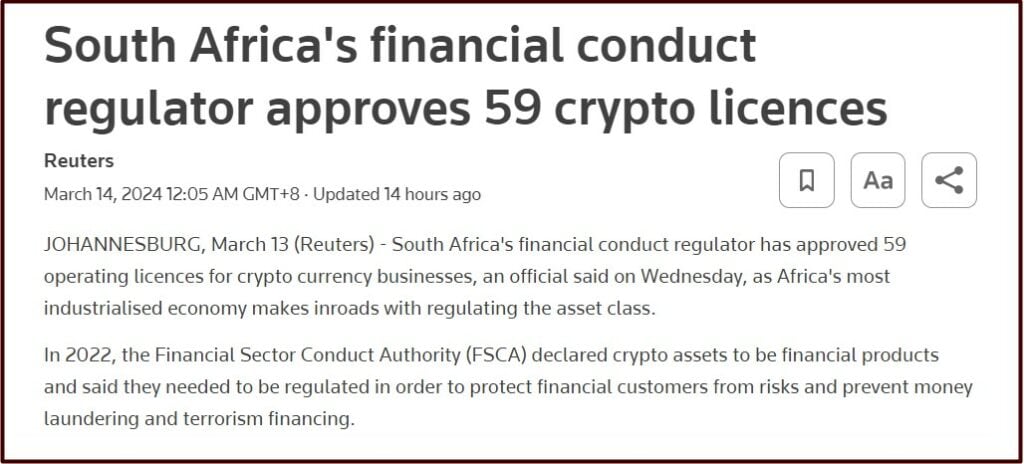
Key Takeaways:
- South Africa has officially begun licensing cryptocurrency exchanges, marking a significant regulatory milestone as the first African country to do so.
- The Financial Sector Conduct Authority (FSCA) has approved 59 out of 355 applications, with another 262 still under review.
- The South African National Treasury’s recent policy change to include stablecoins in its definition of crypto assets indicates ongoing adaptations to the regulatory landscape to encompass a broader range of digital assets.
In a landmark move for the African continent, South Africa has started to officially license cryptocurrency exchanges, signaling a significant step towards regulatory clarity and investor protection within the burgeoning crypto market.
As the November 30, 2023, deadline drew near, a flood of applications was submitted, highlighting the industry’s eagerness for formal recognition and oversight.
The Financial Sector Conduct Authority (FSCA) of South Africa, tasked with overseeing the financial services sector, has recently given the green light to 59 cryptocurrency platforms, enabling them to operate under the nation’s existing legal framework.
With a substantial 262 applications still under review from an initial pool of 355, the wave of approvals on March 12, 2024, marks just the beginning of the country’s efforts to bring crypto exchanges under regulatory purview.

These pioneering platforms have sought licensure ahead of a critical cut-off, aiming to align with the stipulations of the Financial Advisory and Intermediary Services Act (FAIS). This legislation is set to fortify consumer protections while granting authorities the leverage to enforce compliance through measures including but not limited to supervision by the South African Reserve Bank’s (SARB) Financial Surveillance Department.
Amidst the evolving landscape, FSCA Commissioner Unathi Kamlana has indicated a readiness to adapt, acknowledging that the current regulatory framework might uncover gaps necessitating further development to adequately address the unique challenges posed by the digital asset sector.
Notably, South Africa has distinguished itself as the first African nation to undertake the licensing of crypto exchanges.
This initiative follows deliberations that began in 2021 regarding the establishment of a tailored regulatory scheme for cryptocurrencies. Despite initial plans to finalize these regulations by 2022, the designation of cryptocurrencies as financial products, rather than currencies, was ultimately decreed by the FSCA, reflecting a shift in regulatory strategy.
The FSCA’s proactive stance extends beyond licensing, as evidenced by previous statements indicating that unlicensed crypto exchanges would face stringent enforcement actions post-deadline, including potential fines and shutdowns.
This resolve was further demonstrated in December when the FSCA revealed it was in the process of evaluating 72 out of 128 applications received by then.

Additionally, in a move to broaden the scope of regulated crypto assets, the South African National Treasury announced in February a policy adjustment to encompass stablecoins within its regulatory ambit, as part of the annual budget review.
This decision underscores the country’s commitment to creating a safe and structured environment for crypto investors and operators alike, charting a path for other African nations to follow in the realm of digital asset regulation.

